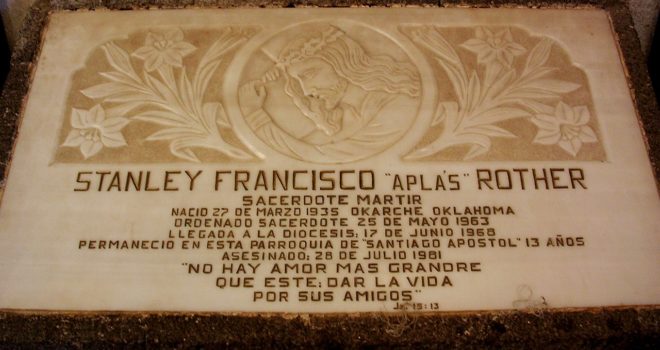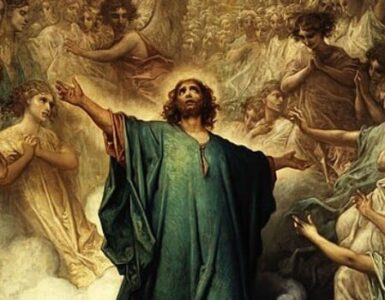“The blood of the martyrs is the seed of the Church.”
– Tertullian
Throughout the Church’s dynamic history, we have always celebrated and venerated the myriad variety of saints. From the hyperdulia (greatest degree of reverence) we owe to Our Blessed Mother to the dulia (reverence, respect, honor) we pay to all the other saints, the apostles and prophets, pastors and teachers, doctors and virgins of the Church Triumphant have gone before us marked with the sign of faith. They have courageously blazed a trail for us, the Church Militant here on earth. It is the martyrs (from the Latin “martyrus,” meaning “witness”) who gave their lives by suffering death for Christ and for the gospel. And one of them is one of us, an American from the Great Plains of the Southwest.
“When he broke open the fifth seal, I saw underneath the altar the souls of those who had been slaughtered because of the witness they bore to the word of God.” (Rv 6:9)
A few days after this year’s
Solemnity of All Saints, an important event in the Church here in the United
States will take place. On Sunday, November 3, 2019, the Archdiocese of
Oklahoma City will host a groundbreaking ceremony for the Blessed Stanley Francis
Rother Shrine. It is here that his body will be interred and it will become a world-wide
pilgrimage site. He is not only the first martyr who was actually born and
raised in the United States, but also the first priest from the U.S. who, on
September 23, 2017, was beatified.
“Before I formed you in the womb I knew you, before you were born I dedicated you, a prophet to the nations I appointed you.” (Jr 1:5)
Stanley Rother was born on March
27, 1935 in Okarche, Oklahoma, the oldest son of Gertrude and Franz Rother. He
grew up on the family farm and was only too familiar with hard work, balancing his
chores at home with school and athletic activities, as well as helping at Holy
Trinity Parish as an altar server. He discerned a call to the priesthood as a
high school student and struggled academically in his formation program,
initially failing his studies in Latin. Through determination and perseverance,
however, Stanley graduated from Mt. St. Mary’s Seminary in Emmitsburg, Maryland
and was ordained a priest on May 25, 1963. For the next five years he began his
ministry as an assistant pastor in Oklahoma.
“Go, therefore, and make disciples of all nations, baptizing them in the name of the Father, and of the Son, and of the Holy Spirit…” (Mt 28:19)
Prior to Fr. Stanley’s ordination,
Pope St. John XXIII made an appeal to the Churches of North America to help
with the foreign missions, particularly those in Central America. Fr. Stanley
was drawn to respond to the Holy Father’s call to serve the Church abroad, and
after receiving his bishop’s permission to seek pastoral work in South America,
he drove his Chevy more than 2,000 miles to the Oklahoma Archdiocesan Mission
of Santiago Aititlan, Guatemala in 1968. Working and living among the people of
the Tz’utujil (ZOO too hill) Tribe, descendants of the ancient Mayans, Fr.
Stanley brought his pastoral gifts, agricultural skills and tireless work ethic
for those to whom he ministered. Since there was no manageable translation for
the name “Stanley” in their language, the indigenous people referred to him as their
beloved “Padre Francisco.” He made a significant impact in the improvement of
their lives from both spiritual and economic perspectives.
“I am the good shepherd. A good shepherd lays down his life for the sheep.” (Jn 10:11)
Due to the ongoing political unrest in the form of a civil war in Guatemala, Fr. Stanley knew his name was placed on a “death list” by the government who targeted those they deemed their enemies. He incurred their wrath by comforting the families of others who preceded him on the death list and giving murdered victims dignified burials. Returning to the United States to preserve his own life was certainly an option, but one he ultimately refused to exercise. He sent a letter to friends in Oklahoma in December of 1980, discussing the violence and the impending threats against him in Guatemala at the time: “This is one of the reasons I have for staying in the face of physical harm,” he wrote. “The shepherd cannot run at the first sign of danger.”
On the morning of July 28, 1981, three men who were never identified, hostile toward the native population and the poor of Guatemala, broke into Fr. Stanley’s home. A struggle ensued, two shots were fired and Fr. Stanley was dead.
“No one has greater love than this, to lay down one’s life for one’s friends.” (Jn 15:13)
The Tz’utujil knew him as their
shepherd who embodied Christ’s admonition to stand fast and not run like the
hireling at the appearance of the wolf. For 13 years Padre Francisco lived and
worked with his people, ate with them on the dirt floors of their huts,
administered the sacraments to them (as many as five Sunday Masses in four
different locations and nearly 1,000 baptisms annually), and cared for them to
the best of his ability. The formerly failed student of Latin learned both
Spanish and the rather difficult dialect of Tz’utujil in order to better communicate
with his parishioners and the local villagers. He is remembered for his
kindness, his gentle smile, his unwavering compassion and encouragement and his
generosity. But most of all, he is remembered for how he loved, following in
the very footsteps of his Master: “He loved his own in the world and he
loved them to the end” (Jn 13:1).
Fr. Stanley believed and literally
lived the gospel message, “For where your treasure is, there also will your
heart be” (Mt 6:21). Because when a delegation arrived to transport his
body to be buried in his native Oklahoma, the people he loved and served physically
barricaded the road and refused to allow his body to leave them. After some
negotiation, it was decided his remains should rightfully be returned to the
U.S.Yet the Body of Christ in and among Fr. Stanley’s parishioners was
his treasure, and they asked that his heart remain with them. And there in
Guatemala his heart is enshrined today.
“For whoever wishes to save his life will lose it, but whoever loses his life for my sake and that of the gospel will save it.” (Mk 8:35).
O God, fount of all holiness,
make us each walk worthily in our vocation, through the intercession of your Saints,
on whom you bestowed a great variety of graces on earth. Having graced your
Church with the life of your priest and martyr, Blessed Stanley Rother, grant
that by his intercession this humble flock may reach where the brave shepherd
has gone. Grant that your Church may proclaim him a saint living in your
presence and interceding for us. Through Christ Our Lord. Amen.
Blessed Stanley Rother, pray for us.
image: jeremy Seto [CC BY-SA 2.0], via Wikimedia Commons













